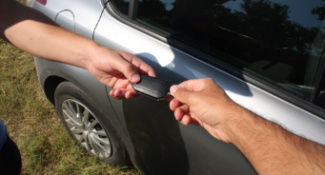Buying a new car often marks an important milestone in someone's life. Whether it's your very first car or your family is growing, and you need a larger vehicle or a cheaper one or a different body style.
If you took the plunge into purchasing a new car, you might be looking back at your garage and wondering if you made the right decision. Unfortunately, in most cases, you won't be able to return the car, even if you have buyer's remorse.
While the dealership that sold the car to you is usually not legally obligated to accept the vehicle back, there are some exceptions to the rule. They may allow you to return the car if there are mechanical issues, for instance. This article details if you can return a car after buying it and how long you have to return a new car.
Can You Return a New Car After Buying It?
The new car smell in a brand new vehicle is always a win when driving it away from the showroom floor as you watch the first miles tick onto the odometer. What happens if you decide against the new car purchase you just made? Can you return a car after buying it if it is out-of-the-box brand new? Unfortunately, no.
Many consumers believe that the Federal Trade Commission protects them with the three-day "Right to Cancel" clause when buying a new car. However, this law does not apply to new car purchases. It only applies to consumer purchases from door-to-door salesmen or at a temporary location other than the seller's regular place of business activity.
There is no federal law in place dictating that car buyers may return a new car. The purchase is final as soon as the buyer signs the sales contract and takes possession of the car. There is also no state-mandated right to rescind the sales contract and return the car because you have buyer's remorse and have changed your mind.
One exception for returning a new car is if it is a lemon. Lemon laws are not the same as the right to rescind laws or buyer's remorse, and as mentioned earlier, apply more commonly to new cars.
Can You Return a Used Car After Buying It?
In most cases, you cannot return a used car after buying it. But you don't know for sure until you ask. The best time to ask is before you finalize the purchase, for example, at some point during the car buying process. Some dealerships have a return policy, but it's better to find that out in advance. Still, most dealerships are unlikely to allow you to return a used vehicle unless there's something seriously wrong with it.
Different states have different rules concerning contract cancellation on used cars. For instance, California requires car dealers to offer used car buyers a contract cancellation option. The two-day cooling-off period does not apply to new cars.
Possible Reasons to Return Your Car
Possible reasons to return your used car purchase besides buyer's remorse include financial or mechanical issues. The dealership may be willing to discuss a possible return if you cannot afford the car and make payments towards it. If the car has mechanical issues, then the return depends on how the lemon laws work in your state and the terms and conditions of the car return policy with the dealership.
Here are some reasons you may want to return your used car purchase:
You Got Ripped Off:
You may have been a little quick to sign the sales contract for your new car, and now you have realized that you got ripped off on the purchase price. If this is the case, then you should consider meeting with the manager of the car dealership. Take along all the documentation required to corroborate your claim of paying an unfair amount.
If you want to do some more research, you can look up the value of your car by comparing the purchase price of vehicles with the same make, model, and similar mileage on Carfax or Kelley Blue Book.
Remember that you already signed the contract for your car, so your options are limited if the manager decides that your request is invalid.
Your Car Payments Are Too High:
Now that the excitement of purchasing a new car has settled, you may realize that you actually cannot afford the monthly car payment. Unfortunately, you will face a challenge because the general manager may argue that you should have closely examined your finances and sales contract before committing to the car you purchased from them.
It will be up to the car dealership to decide whether they will accept the car and exchange it for another more affordable vehicle. First, speak to the salesperson you initially dealt with; if that doesn't work, then sit down with the sales or general manager and calmly plead your financial situation with them.
If the car dealership decides they cannot assist with a full refund or offer a less expensive vehicle, you will need to explore other methods to lower your monthly payments. You may need to refinance your auto loan with a lower interest rate or a longer-term if you want to lower your monthly payment.
Mechanical Problems:
If your reason for wanting to return your used car is because it has mechanical issues, then you may need to take multiple trips to the dealer's service department. Ensure you record each visit and transaction and make sure your complaints are recorded in detail on all repair instructions.
If the mechanical problems persist, you may have a lemon, which is a car beyond repair. Most states have some form of lemon law in place to protect buyers from buying or leasing a car with severe defects.
Lemon laws vary from state to state, and each state's Attorney General's office defines the enforcement of the lemon laws. They typically only apply to new cars, but some also apply to used vehicles. The lemon law applies to any vehicle that still has mechanical problems after a certain number of repair attempts. Often the mechanical faults deem the car unsafe to drive or are detrimental to the vehicle's operation.
If your car is a lemon, the car dealer usually has some time to rectify the problem so that the vehicle is safe and usable again. If they cannot repair it after a certain number of attempts, then the buyer is generally eligible for a full refund or replacement vehicle with a similar value.
Buyer's Remorse - You Changed Your Mind
You may have the most challenging time returning your car if you have simply changed your mind about it. Buyer's remorse may not be enough of a reason for a car dealership to consider the return, especially considering that few dealerships have a return policy in place. Once you put pen to paper on the sales contract, you are responsible for accepting and paying for the vehicle you purchased.
What Kind of Dealer Return Policies Are There?
Some dealerships that don't follow the traditional model do have return policies to assist car buyers. For example, companies such as Carmax and Carvana have certain conditions that will allow you to return a newly bought car.
The policies usually have some strict guidelines to follow, like a specified return window or mileage limits. There's no federal or state law requiring dealers to have a return policy, so it's entirely up to them if they want to work with you or not. Again, it's a good idea to find out if there's any policy for returning a car before you buy it.
How Long do you Have to Return a New Car?
The FTC has a Cooling-Off Rule. It is a rule in which you have three days to cancel a sale made either at your home, workplace or the seller's temporary location. Purchasing a vehicle is one of the exceptions to the rule. Even if the dealership sells you a vehicle at a temporary location, the Cooling-Off Rule does not cover car purchases, so it's essential to understand that before purchasing a new car.
The time frame covered by lemon laws varies from one state to another. Depending on which dealership you purchased your car from, you may have between one and two years to institute legal action and return the newly bought car.
Some dealers, like CarMax, provide car buyers with a five-day return policy. This policy is not enforced by any state laws; instead, it is a sales incentive. If a car dealership offers you a return policy, make sure you have written proof of it.
Alternatives to Returning Your Car
Below are some alternatives to returning your newly-purchased vehicle, especially if the dealership has declined your request to return the car.
Sell Your Vehicle:
An alternative to returning your car is to sell it. You can also make a trade-in for a different vehicle. Unfortunately, it is challenging because a new car immediately depreciates when you drive it away from the dealership lot. Getting total value for a new car to recoup the purchase price is highly unlikely. If you've financed your new car, then the process is even more difficult. If you end up having to sell it for less than you paid for it, then you will be on the line for the difference in the remaining loan amount.
Refinancing Your Car Loan:
If the primary cause of your buyer's remorse is that you can't afford the payments, then, as we mentioned earlier, you might consider refinancing the loan amount. You could get a longer-term or a lower interest rate to lower your monthly payments. Remember, if you stretch out your loan term, you'll pay more interest in the long run.
When comparing different loan options and terms, use an auto loan refinance calculator to determine how much money you can save.
Repossession:
If you can't make your car payments and you can't sell your car or get refinancing, then you might be able to get in touch with your lender and opt for a voluntary repossession.
If you do this, you might be off the hook for repossession costs, which the lender would otherwise leave you with for an involuntary repossession. However, you will still be liable for paying the difference between what you owe on the car and what the lender can sell it. The other problem with this is that lenders might report you to the credit bureaus, which will lead to negative marks on your report for as long as seven years. This option should be your last resort in getting rid of your car.
Ask For a Limited No-Risk Return:
This requires some foresight on your part. During negotiations to buy your new car, you might be able to express enough doubt in whether the vehicle is right for you to convince the sales manager to give you a limited return window. Usually, that could be two to three days to drive the car home and, if you're not fully satisfied, you can bring it back. The dealership will likely impose mileage restrictions on top of the time limit, and they will also likely charge a restocking fee if you return it.
How To Avoid Buyer's Remorse in the First Place
Owning a car that you no longer want is not pleasant, especially since you have so few options available to get rid of it. Avoid the challenge of wanting to return a newly purchased car and take some precautions to make sure that you're getting the car you want and, more importantly, a vehicle that you can afford.
Know the Car's Value
Before starting the car buying process, you should know the fair market value for your prospective vehicle. Research sites like Kelley Blue Book and Edmunds to find out what a similar car is selling for in your area. That can help you get a fair price and avoid overpaying.
Set a Strict Budget
It's also crucial to know how what car you can afford. Start by getting a preapproval so that you have some idea of what your interest rate and loan amount might be. It's also a good idea to look at your monthly expenses and find out what kind of car payment amount will suit your budget comfortably.
Take a Good Test-Drive
Most buyers take a test drive of their prospective vehicle, but if you're having second thoughts, you might consider taking multiple test drives before you decide. Don't just drive the car you're interested in either, but rather compare it with other vehicles in the same price range. Take note of anything that you don't like during that process. Even minor annoyances can later turn out to be big problems and leave you with buyer's remorse. If you don't love the vehicle, it's probably a good idea to take some extra time to decide.
Don't Rush
Buying a car is a huge purchase. Not only is it expensive, but it's something you'll likely be spending a lot of time with. It's never a good idea to rush into a new car purchase. Take as much time as you need to fully research the cars you're interested in and take as many test drives as you need to make sure you like them.


